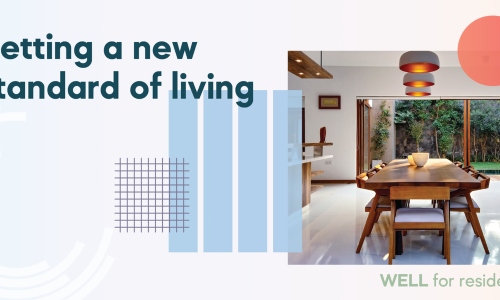In a development years in the making, the International WELL Building Institute (IWBI) has officially announced its WELL for residential program. Launching initially with 25 global pilot participants, the program has nearly 30,000 homes and residences already enrolled..
During this pilot stage, IWBI will work with global users and collect stakeholder feedback to refine the new standard, ensuring it is a robust, globally applicable roadmap for healthier, more resilient homes.
WELL for Residential Brings a Tailored Approach to IWBI’s 10 WELL Concepts
Initially introduced in 2014, the WELL Building Standard nearly saw explosive growth following the pandemic and continues to see widespread pursuit on a global scale as both the health and financial benefits of better building practices continue to be uncovered by both prospective residents and researchers.
To date 30% of Fortune 500 companies across nearly 130 countries have adopted WELL strategies in more than 40,000 locations totaling almost five billion square feet of space.
Building upon the WELL Building Standard through the work IWBI has already been conducting in the multi-family resimercial sector, the WELL for residential uses a similar evidence-based, third-party verified certification program.
The framework draws upon pre-established WELL concepts that consist of Nourishment, Air, Materials, Sound, Nourishment, Community, Mind, Water, Light, Thermal Comfort and Movement as a means of developing evidence-backed outcomes in building proposals.
According to IWBI, development of the residential program drew upon nearly two years of industry input, market insight and expert recommendations from its board of roughly 100 globally renowned subject matter experts from the construction, architecture, public health, government, academia and engineering fields.
IWBI also notes the need for more resilient home construction during a time when natural disasters such as wildfires, hurricanes and tornadoes are becoming more prevalent with more destructive results.
According to IWBI, the methods outlined within the new WELL residential program offers more than 100 strategies to build homes that adhere to these principle.
The goal of these new guidelines, according to an IWBI spokesperson, is to help provide building professionals with a set of proven values that can contribute to better living standards on projects.
The new framework is applicable to both single family homes and MDUs.
How a Project Can Qualify for the WELL Residence Standard
Projects can earn the WELL Residence seal for residences upon completion of third-party review and verification of selected strategies. To attain a WELL Residence certification, a home must achieve at least 40 points.
Projects also have an opportunity to earn a pre-certified WELL Residence status upon preliminary design review, an incremental milestone that allows participants to communicate achievement before construction is completed.
“We are excited to work side by side with our pilot participants, as well as hundreds of stakeholders along the residential sector value chain, to introduce this transformational roadmap that will help market leaders adopt health-first strategies into how we design, operate and maintain our homes,” said Rachel Hodgdon, President and CEO, IWBI.
Hodgdon also applauded the pilot participants for their leadership and commitment to creating healthier living environments for residents.
To date, participants of the WELL for residential program include but not limited to:
- AM Gebiedsontwikkling & Redevco – Hollandse Meesters, Amstelveen
- ARCHETYPE Investments – Continuum 115 Apartments
- Assembly OSM – 147 St. Felix Street and 247 East 117th Street
- Baopu Development – Baopu Care
- Caplow Manzano – CM1
- City Sanctuary Development – Albion Court
- Corvias – United States Army and the Department of Defense Military Housing
- d2d Green Design – Singh Residence
- Daiwa LifeNext – L-Place Esaka II
- First Wave Development – Soho Capital Project
- Foshan Green Neighborhood Villa Technology – Green Neighborhood Villa
- Johnson Development – Jubilee
- Magleby Development – Velvaere
- Minto Communities – 123 Portland
- Patron Capital Advisors – Cotown
- Shea Homes San Diego – Fox Point Farms
- Seneca – Seneca at Southern Highlands
- Synchro PM1 doo – Synchro Yards Water Residences
- Urban Green Development – 1643 Boulder







